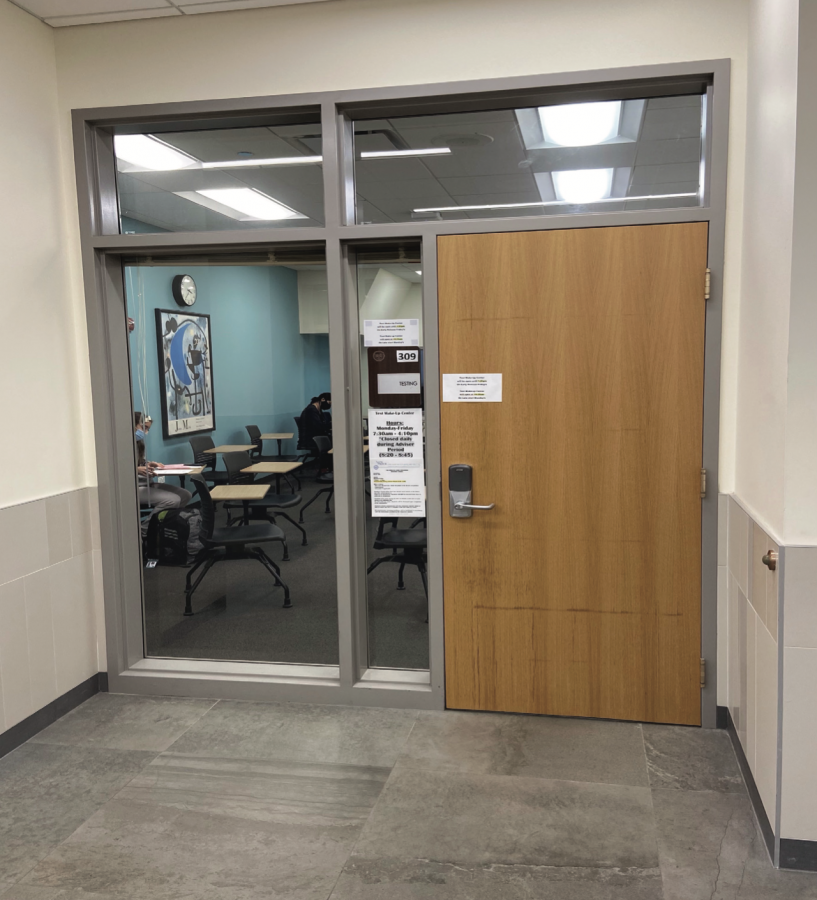Test Make-Up Center struggles with student cheating
Students use class notes and technology while taking tests
The center, located in Room 309, is where students go to complete tests they missed due to an absence.
The New Trier Test Make-Up Center is back in business this year; but with more tests being proctored, student cheating continues to be a problem.
The Test Make-Up Center is monitored by two proctors; so if both proctors divert their attention, students are able to use their phones to seek out answers during their tests.
Before the pandemic, the Test Make- Up Center made students place their bags in bins before taking a test. Now this is no longer a requirement.
Senior Goldie Braun said that now you can keep your bags next to you when you take a test.
“If you need stuff, you don’t have to get up to grab it,” she said.
This makes it easier for students to be able to quickly grab any prohibited tools (such as phones, cheat sheets, and at times iPads) when taking their test.
The center also does not have any timers to keep track of students’ allotted testing times; they could potentially test for a longer amount of time then they normally would in a classroom.
Testing Office Assistant Ryan Janken explained that he only records the start times, not the stop times, of each student that comes and takes a test. He then uses a “rough estimate about how long [students have] been [testing].”
Janken also said that the Test Make-Up Center is large, so students could potentially sit as far away from him as possible to avoid getting caught using prohibited materials.
Testing Manager Alan Pavlik explained that around 10 years ago, the most common form of cheating used to be cheat sheets. Now, it’s phones.
“Guys just [do a] quick search in Google,” he said.
The testing center has an average of about 50 students taking tests every day. Out of that 50, Pavlik said there are about two to three cheaters every one to two weeks.
At one point, cheating tended to be a trend, said Pavlik. Students would have their parents excuse them on test days because they may not have been ready to take a test.
“If you had math class eighth period, and you had a test in that math class, you would go to all of your classes up to a certain period, and then your parents would excuse you because you don’t feel ready for that particular test,” said Pavlik.
Senior Kate Keller believes that COVID did not have much of an impact on student cheating, so the cheating methods from this year compared to last year shouldn’t be too different.
“The thing with my test was that it said it’s open-note, but the record doesn’t show [which] notes you’re allowed to use or not. Technically, I can pick out anything I want,” Keller stated.
Math teacher Robert Berlin is aware that there have been academic integrity issues at New Trier, and that teachers are trying to watch out for kids cheating in order to protect the integrity of the kids who don’t. But there is a cost to every benefit: making up a different exam for every student is a difficult solution in the long run.
“To say that with 4000 students at New Trier altogether with two campuses that there [are] no problems of academic integrity would be a foolish position to take,” Berlin commented.
Many teachers use Canvas quizzes for their tests, which could prompt students to exit out of their Canvas app to search for answers online.
Since answers found on the internet could be different compared to content discussed in class, Social Studies teacher James Wright is better able to detect student cheating on short answer questions.
“Normally when students cheat, with multiple-choice I probably won’t be able to tell. But with short answer questions, unfortunately I have caught some students in the past who have violated academic integrity,” said Wright.
One way Wright tries to preempt cheating is by talking to students about what testing ultimately means.
“Your performance on a test only says something about how you studied or prepared for that particular test,” said Wright. “But if you are cheating, right then that’s saying a little bit more about your character,”









































